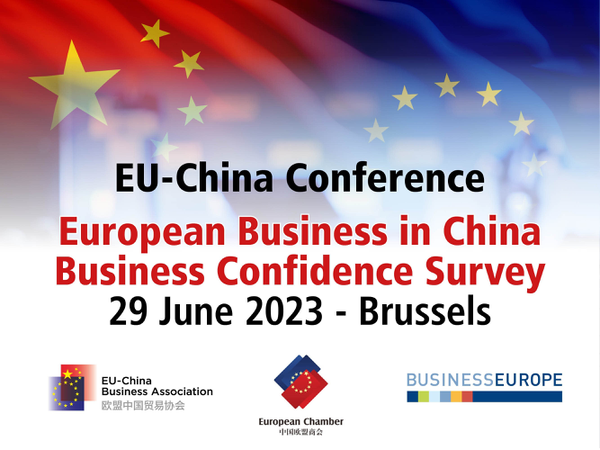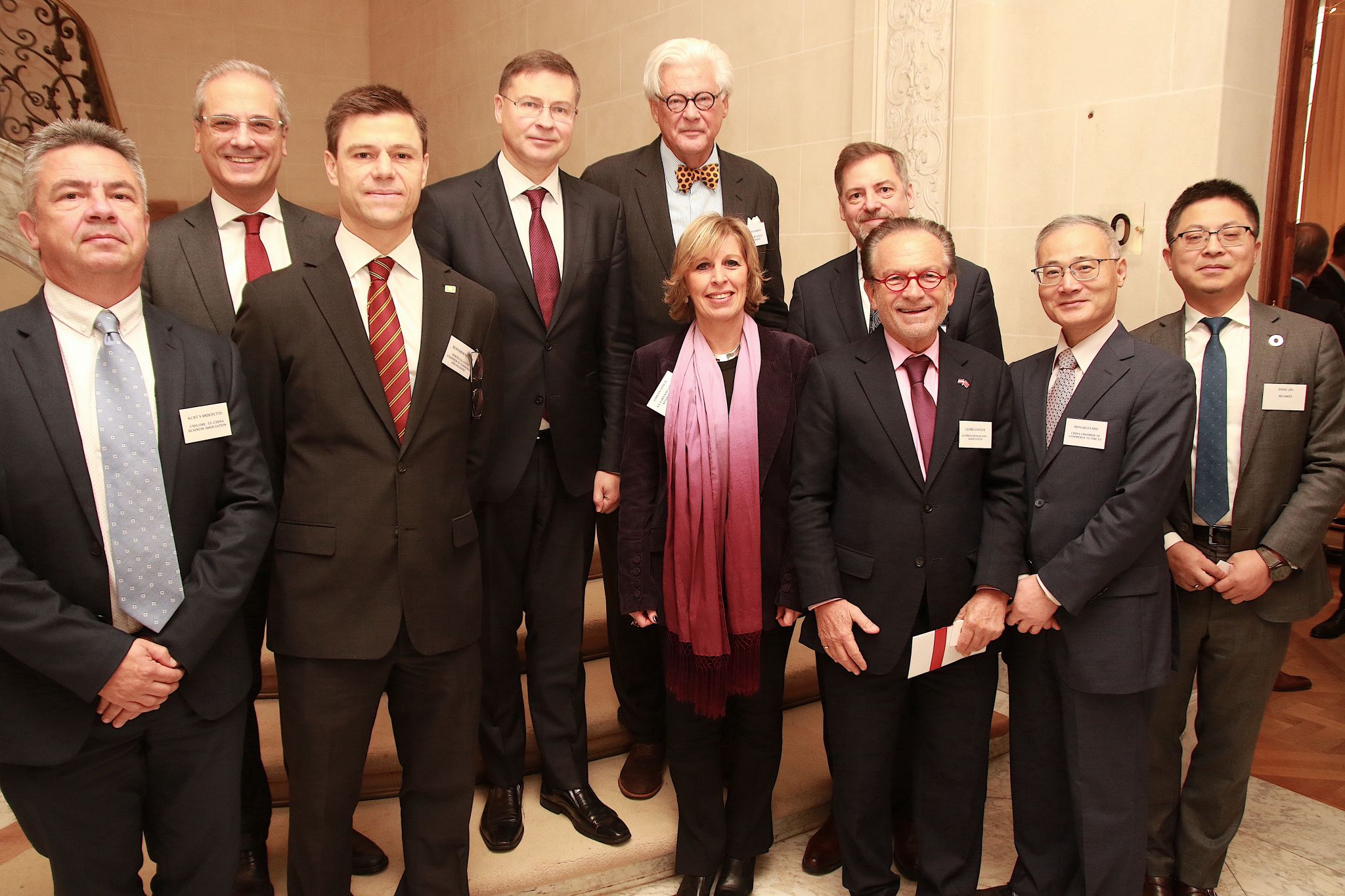with H.E. Mr Zhang Ming, Ambassador of the People’s Republic of China to the EU
De Warande, 11 June 2019

Remarks by H.E. Ambassador Zhang Ming
Chairman Jochum Haakma,
Ladies and Gentlemen,
It’s great to be back to the EU-China Business Association. I still remember that last year, we not only enjoyed delicious food together, but also nutritious food for thought. Since then, a lot of things have happened. Now everybody is talking about the China-US trade tensions. Let me first share a few thoughts on that.
I don’t think it is a secret to anyone now why the trade frictions flared up and how things have come to what it is today. The root cause is that the US administration, chanting the slogan of “America First”, goes for unilateralism, protectionism and economic hegemonism. The US side makes a lot of groundless accusations on China, resorts to economic blackmail with tariff increases and attempts to impose its demands on China with maximum pressure. The US is also going to great lengths under the guise of national security to bring down Chinese companies and disrupt normal scientific and technological cooperation and market competition. This shows nothing but a hegemonic mindset that “Only I shall develop, and you shall not”.
In the common interest of China and the US, and for the sake of proper order in world trade, China is committed to the basic principle of resolving disputes through dialogue and consultation. China has responded to American concerns with utmost sincerity and patience. China has tried to build consensus with the US while reserving and properly addressing the differences. China has overcome all sorts of difficulties, engaged in many rounds of dialogue and negotiations with the US and put forward pragmatic proposals. In short, China has made painstaking efforts to stabilize its business ties with the US. But the US, in return, has gone back on its words over and over again and kept creating new problems. This has eventually led to spiraling trade tensions between the two countries.
China is not the only victim. The stick of tariffs has been wielded at many, including the EU. While the steel and aluminum issue is pending, the auto tariff is like a sword hanging over Europeans’ heads. With the doctrine of “America First”, it seems that any country and any sector could become an easy target at any time. Our world could not be more uncertain.
What the US does poses grave challenges to the international multilateral trade order, and is weighing on global growth, including growth in Europe. IMF warned that the threatened tariffs could wipe $455 billion off global GDP next year, larger than the size of South Africa’s economy.
For multinationals, like those you represent, the US abuse of tariff threats and long-arm jurisdiction is a source of great uncertainties. Business is business. To put a political or security label on business issues would disrupt global industrial and supply chains. Just think of it. There might be one day when your products are subject to an additional 25% tariffs, or your company is charged with breaking export control rules on shaky grounds, or even your employees are arbitrarily arrested while they are traveling overseas. For any company, it would be simply a nightmare.
Nobody likes uncertainties. We could hardly look to the “stable genius” to become more predictable. Given that, it is even more important for China and the EU, two major economies, to join forces to counter unilateralism and protectionism with the stability of their cooperation. I want to make three points here.
First, China and the EU should work together to foster a more stable and predictable business environment. An important task is to conclude the bilateral investment treaty as scheduled. At the China-EU Summit last April, both sides committed to pushing for decisive progress in BIT talks by the end of this year and concluding an ambitious treaty next year. The treaty aims to substantially improve market access, prohibit discriminatory policies and practices on foreign investors, and establish a balanced framework for investment protection. Last month, the two sides exchanged ideas on the next steps, and agreed to hold two rounds of talks before summer break. We also made positive progress on other fronts after the Summit. The civil aviation safety agreements are a good case in point.
In my engagement with business friends, insufficient IPR protection is a complaint I have heard most. The Foreign Investment Law adopted by China earlier this year stipulates that the intellectual property of foreign investors shall be protected, and prohibits forced transfer of technology through administrative means. The Joint Statement of the China-EU Summit also underlined the importance of following international standards in IP protection and enforcement.
I must confess that there is still room for improvement on the ground. Please rest assured that China’s stand on IPR protection is clear-cut and firm, since it is what China must do to pursue its own high-quality development. To make our work more effective, we are open to any constructive advice, suggestion or even criticism from business friends like you.
Second, China and the EU should jointly stand for greater openness. In the past years, China has taken specific steps to open up wider. At the second Belt and Road Forum for International Cooperation, Chinese President Xi Jinping said that China will expand market access for foreign investment in more areas, work for the all-round opening-up of modern services, manufacturing and agriculture, and allow the operation of foreign-controlled or wholly foreign-owned businesses in more sectors. We will continue to significantly shorten the negative list for foreign investment. This month, we will introduce an updated version of negative list, which will be shorter than the previous one. Though some may choose to close the door, China will open its door wider and wider. This direction would not change.
The EU has been known for market openness. China has learned a lot from its EU partners. Yet some recent rhetoric or actions by the EU and some member states on investment screening, public procurement and industrial policy have got some Chinese companies concerned. Some are asking if the EU is trying to put up more barriers, while China is trying to put down barriers. I hope that such concerns are unnecessary, and that the EU will keep an open, fair, unbiased and non-discriminatory approach to Chinese companies.
Third, China and the EU should jointly uphold the WTO-centered multilateral trading system. China and the EU are supporters, guardians and beneficiaries of multilateralism. There is no denying that the WTO is not perfect. Yet we are opposed to the abuse of national security exemptions and trade remedies, and reject any unilateral actions in breach of WTO rules.
China and the EU have good communication and cooperation on WTO reform. We work together to tackle the Appellate Body crisis, and to build consensus in other areas as well. We share the objective of conducting necessary reform of the WTO, resolving the crisis that threatens its existence, enhancing its credibility and relevance in global economic governance.
Ladies and Gentlemen,
Despite uncertainties in global economy, China has managed to keep steady growth. Thanks to the complete industrial system, abundant human resources, growing R&D input and infrastructure, China is well-equipped to achieve higher-quality development. In 2018, consumption contributed 76.2% to China’s growth. China has a vast market of nearly 1.4 billion people and a huge middle income group of over 400 million people, which means another one billion Chinese are expected to enter the same group in the years to come. Chinese market would unleash even greater potential, which could underpin a sustained growth of Chinese economy at decent rates. I am sure that this is a source of huge opportunities for European businesses.
Facts and figures tell the truth. In 2018, China-EU trade went over $680 billion, up by 10.6%. EU real-term investment in China amounted to $10.4 billion, up by 26%. According to the business confidence survey recently released by the EU Chamber of Commerce in China, Chinese market remains a top-three destination for current and future investment for 62% of respondents, with 56% looking to expand their current operations in 2019. 75% of respondents reported positive earnings for 2018. I am encouraged to see the interest and confidence of European companies in the Chinese market.
To be brief, we continue to welcome European investment in China with open arms, and we are all ears to the advice and recommendations of European businesses. With joint efforts, we could have greater mutual trust and greater opportunities for cooperation, for our own good and for the good of the global economy.
Thank you. I look forward to a productive discussion over lunch with all of you.





